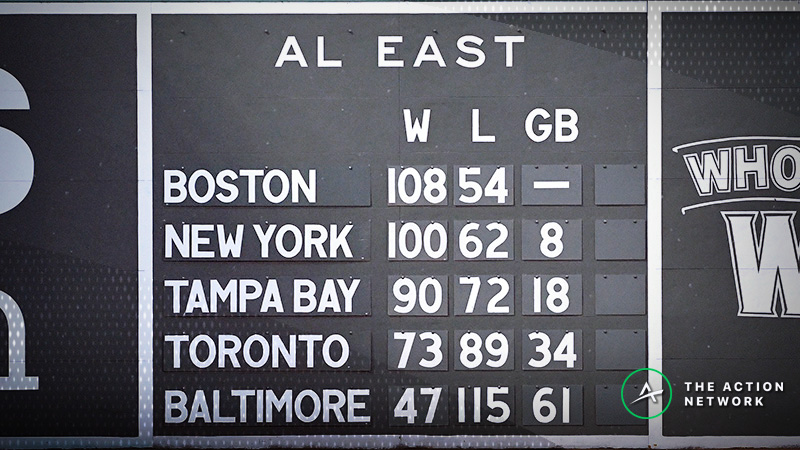How Often Does the Team With the Best Record Win the World Series?
Brian Fluharty, USA Today Sports.
- It is very hard to predict October baseball and betting on it is even tougher.
- How often does the team with the best record win the World Series? What about the team with the highest WAR?
- What stats are predictive and can help you find value in betting the playoffs.
At almost every casino I've ever visited, there are superstitious craps players. When I say superstitious, I mean that they observe absurd rituals in an attempt to influence which way the dice fall during a roll.
Players will see a shooter get hot, and then re-enact their entire pre-roll routine — who they talk to, what words they say, which foot they lift, how they breathe, which hand they hold their chips in — EVERY single roll, all in an effort to keep the luck going. If the conditions stay exactly the same around the table, they must believe, the dice will fall the same way as well.
This is, of course, insane.
There's also selective memory involved. If a superstitious player lowers their foot at the wrong time, and a shooter rolls a 7, ending the turn and generally losing most people money (most people bet on the shooter), the player will attribute that bad outcome to the lowering of the foot, rather than random chance.
Same with new stickmen coming in (the casino employee who passes dice and sort-of "runs" the game). A new stickman passes the dice, the shooter rolls a 7, the turn ends, and everyone rolls their eyes. "Of COURSE, the casino brought in the cooler. Unbelievable. The new stick man, that's what did it"
Yes. It is unbelievable, that humans still think these things.
With the baseball playoffs approaching, you may be engaging in selective memory without even realizing it. How do you pick your World Series champion? How do you pick your pennant winners? Are you considering only the times you were right using this methodology, and forgetting all those times you were wrong?
Because I've noticed that when it comes to handicapping October, baseball becomes as unpredictable as anything we see during any sport. Here are five methodologies you may use, and here are the outcomes you would get in those cases.
The Team with the Best Record Wins
We may all be smart enough to realize that record isn't the best way to figure out who is going to win, but just in case there's some inherent bias, let's try to eliminate it.
In the last 10 seasons, only once have the two teams with the best records in each league played in the World Series. That was 2013, when the Cardinals and Red Sox won the pennant(s). Five times in the past 10 seasons, NEITHER team with the best record won the pennant.
Wild Card teams have had a habit of getting hot as the postseason goes along and having unpredictable success, but the best teams? They don't really do as much as they're expected to.
This is important to remember because in the futures markets, the teams with the best records are generally priced the lowest, and if that's how the pricing is being done, that may be incorrect. A flatter structure may be a better option.
The teams with the best records this year in each league are the Red Sox and the Brewers (the Brewers and Cubs tied for the best NL record after 162 games).
The "Hot" Team Down the Stretch Wins
This is one you hear a lot (in fact my colleague John Ewing wrote a piece on this theory here). The thought is, well, OK, the regular season overall produced a certain set of results, but late in the season an under-the-radar team emerged, got hot, and THEY are actually the most likely to win the World Series because they are playing the best right now.
Well you immediately hit a roadblock there too. The Dodgers were 13-17 in September last year. Not so hot. The Astros were 19-10, but the Indians were an astonishing 26-4.
This research would have led you to Cleveland. The year before, it would have led you to the Red Sox (and not the Indians, who won the pennant). The Nationals had almost exactly the same September record that year as the Cubs (who won the World Series). Going back further you get similar results. You're no further to figuring out who's going to win, or who has the best value.
This year, the team's that were the "hottest" down the stretch were the Astros and the Brewers.
The Team with the Highest WAR Wins
Who would use "best record" when a statistic as awesome and all-encompassing as WAR exists? Surely this statistic will tell us who the best team TRULY is, as they are so much better in the aggregate at their various positions than other teams.
Since the strike-shortened season of 1994, there have been 23 World Series match-ups. In those 23 seasons, the league-leaders in overall WAR from each league have met just three(!) times. The last time it happened was 2007, when Boston and Colorado advanced to the Fall Classic. In nine of the past 23 seasons, NEITHER league-leader in WAR won the pennant.
This year, the league-leaders in overall WAR by league are the Astros and the Dodgers. (All WAR calculations are from Baseball Reference).
The Team with the Best Pitching Wins
Good pitching beats good hitting. An axiom as old as baseball itself (which is to say, it's really, really, really old). Surely the teams that pitch the best in the regular season translate well to the playoffs, where this saying can come to fruition?
ERA is a flawed statistic, but let's start there. The Dodgers were second (first in the NL) in team ERA last season. OK, that's good. The Astros were 11th in the majors last season in team ERA. Houston was 11th in WAR from starting pitching. The Dodgers were seventh. Hmm. Not as good.
Let's cast a wider net, going backwards. Over the past five seasons, the league-leaders in team ERA never played in the World Series, and only twice did a team win the pennant (so two out of 10 teams).
Pitching WAR is even worse. Only once (the Cardinals in 2013) did a team lead the league in pitching WAR and win the pennant. These stats are completely useless and not predictive! Woohoo!
The league-leaders in team ERA this season are the Astros and Dodgers. The league-leaders in pitching WAR are the Red Sox, and the Phillies, who didn't even make the playoffs. The Rockies have the highest WAR of NL teams who actually made it.
The Team with the Best Bullpen Wins
We hear about these teams all the time too. "This team is constructed to be GREAT in October."
OK, let's look at bullpen ERA. The last five seasons, only the Royals won the pennant and had the best bullpen ERA in their respective league, in 2015. Otherwise, brick after brick. No success to be had. The playoff team who has the best bullpen ERA is not very likely to succeed, or not any more likely than any other team.
In terms of bullpen WAR, it's even worse. Over the last five seasons, among playoff teams, the highest bullpen WAR has never won the pennant. So much for the value of those relievers.
Now, in the playoffs, yes, you will be using your more valuable relievers more often, and your less valuable relievers less often, so perhaps the construction of the bullpen is different and difficult to measure. I think it's also just as likely that in high-stress, high-leverage spots in October, trying to predict which bullpens will pitch amazingly is quite difficult.
This season, the league-leaders in bullpen ERA are the Astros and the Cubs. The league-leaders in relief-pitching WAR are also the Astros and the Cubs (the Cubs tied with the Phillies, but as we've just mentioned, the Phillies missed the playoffs. You'll never believe this, but Philadelphia was dead-last in non-pitcher WAR. But cheer up! It's almost Sixers season).
So Who Wins Then?
Now what?
With any predictive exercise, I think the important question is always: "Is this better than flipping coins? And if so, can that be proven?"
With all of these examples above, I don't think they pass the "coin flip test." You hear them all the time on television, podcasts, etc. because they are awesome narratives for people to use to tell you how to bet.
They sound smart. They fit really nicely into brief discussions about a game. But as you've seen with this season as an example, each exercise takes us in a different direction towards a different team. And that stuff's all noise anyway. So what can actually help you?
Well, my advice would be to use these statistics against themselves. Markets may be slow to react to a bad start by a favored team in a postseason series, thinking that the "better" team with home field advantage will "figure it out."
Basically, a great regular-season team tends to get credit when they should probably not. Cleveland against the Yankees last year, for example. Boston against Houston, as well, where the Astros price did NOT shift dramatically after going up 1-0.
You're getting plus-money or small-favorite mis-pricing, which means you don't have to be right as often to be profitable, as well. A lot of these match-ups are probably much closer to coin-flips than everyone thinks.
Going back further, the playoffs are littered with examples of great teams going down in flames. Rather than look back at all the records and statistics we just went through to guide your decision-making, my advice is that when teams in the postseason are showing you who they are, believe them. Or flip coins. You'll save time.
How would you rate this article?








